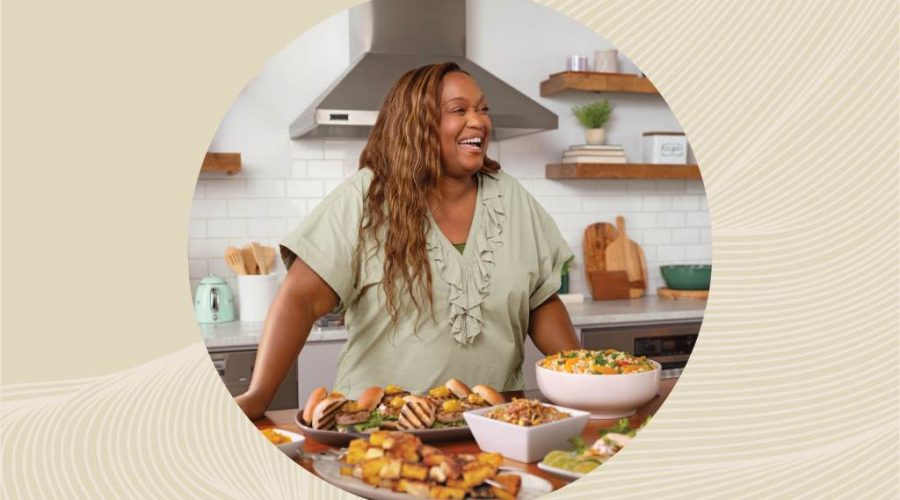I’m a Food Network Chef with Ulcerative Colitis: Here’s How I Make It Work

I first started having symptoms of ulcerative colitis when I was 18. I had just enlisted in the Air Force and was on assignment in South Korea when I started noticing changes in my body. I had bloody stool, urgency to go, and cramps, but I dismissed it as being due to the change in location and new cuisine.
After a few months, though, I knew I couldn’t write off my symptoms any longer. I called my dad, who was a physician, and he immediately told me that I needed to see a gastrointestinal specialist. I went through a battery of tests and was eventually diagnosed with ulcerative colitis, an inflammatory bowel disease that causes inflammation and ulcers on the inner lining of your large intestine. I had all the classic symptoms of the disease.
I was working as a radio DJ in the Air Force—it was very Good Morning Vietnam, but in Seoul—and I learned workarounds for my condition. I knew that the longest song I could play was by Meatloaf—I would put that on and run to the bathroom if I had the urgency to go. But I was also very comfortable telling my coworkers about my diagnosis and some of the things I was dealing with. I was lucky that my colleagues and supervisor were happy to pitch in if I needed to go take care of business.
After the Air Force, I started catering and eventually ended up on Food Network. I’m now 48 and in remission—meaning, I feel healthy and my ulcerative colitis doesn’t impact my day-to-day—but I’ve also learned certain hacks to help lower the risk I’ll experience a flare.
Soon after I was diagnosed with ulcerative colitis, I was asked to take a lot of notes to help pinpoint when my symptoms might become exacerbated. As a result, I’ve learned to avoid certain foods or elements of foods.
Fruits with skins are out—if I eat an apple or peach, I’ll peel it first. I also avoid corn. If I want to eat roughage, I’ll saute it or massage it first. I was massaging kale before it became a thing!
I work with food all day, but it’s become natural to me to manage my ulcerative colitis and being a chef because I love food and eating. I realized that I can still do the things I love and eat the things I like—I just have to do it in a different way. Ulcerative colitis wasn’t going to come in and tell me what I can and can’t do.
As a chef, I love giving options to prepare and make things that work for me and for others. But I don’t think about my ulcerative colitis all the time—it’s just part of me now.
I’ve been open about living with ulcerative colitis and I think that’s helped other people feel more comfortable with my condition as well. I found very early on that if I spoke to my friends, family, and coworkers about what I was going through, they were very receptive. That made it easier for me to navigate life with ulcerative colitis.
That’s why I decided to partner with Pfizer for its This Is Living with UC campaign. The campaign offers advice and guidance for patients with ulcerative colitis around diet, well-being, and support, and also helps educate family and friends.
Now, more people are becoming aware of ulcerative colitis and talking about it. I’m also getting out there and letting more people know that I have it. I did a lot of this on my own after my diagnosis, but it feels good to amplify my voice and try to help others who are going through the same things as I did.
Sunny Anderson is co-host of “The Kitchen” on the Food Network. She’s been living with ulcerative colitis for decades. Story as told to Korin Miller.
What to know about ulcerative colitis
Symptoms of ulcerative colitis can be confused with other gastrointestinal disorders like irritable bowel syndrome (IBS), says Ashkan Farhadi, MD, a gastroenterologist at MemorialCare Orange Coast Medical Center in Fountain Valley, Calif. “The main distinction is usually blood in the stool—you don’t see that in IBS,” he says. People with consistent abdominal pain, a sense or urgency to go No.2, and bloody poop without straining should see a doctor, Farhadi says.
Treatment often involves a mix of medication and lifestyle modifications. In severe cases, surgery may be needed, according to the National Institute of Diabetes and Digestive and Kidney Diseases. “One of the lifestyle modifications is stress management,” Farhadi says. “There is a clear connection with stressful life events and symptoms of ulcerative colitis.”
Researchers have not found that specific foods cause symptoms of ulcerative colitis, but some foods may make symptoms worse—it just varies by person. “I would not recommend any particular diet,” Farhadi says. However, he does recommend that patients take probiotics to help promote beneficial bacteria in the gut. If you have ulcerative colitis, Farhadi says it’s important to talk to your doctor about your symptoms and the best way to manage them. They should be able to offer personalized guidance from there.

Source: Read Full Article

